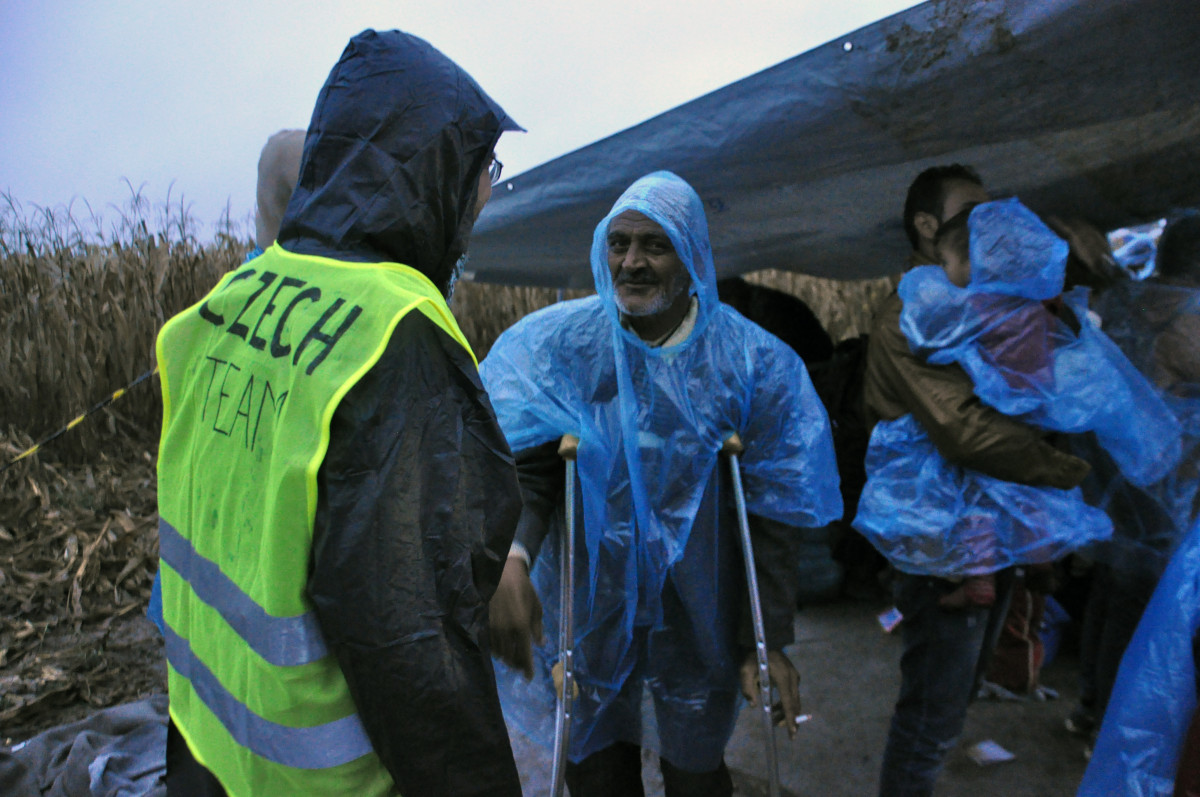The Czech corridor between Serbia and Croatia
Published: Oct 5, 2015 Reading time: 4 minutes Share: Share an articleCzech volunteers are helping refugees in a number of locations along their “Balkan journey”. The largest group is working at the Berkasovo-Bapske border crossing between Serbia and Croatia, where practically all the migrants pass through. The enthusiastic volunteers give as much time and money as they are able, they are on their feet 24 hours a day, just to be able to help the refugees in some way. Thanks to their efforts there are no big problems in these places, and the local humanitarian organizations as well as the UN appreciate their work.

It’s raining cats and dogs. For the third day in a row there is nothing but rain showers and drizzle here. Slimy mud is everywhere and the dampness is starting to creep even into the sleeping bags. There is no place to dry off, and the feeling of putting your feet into wet shoes in the morning is not very pleasant. But you stop complaining when you see who you are doing this for – the refugees. A bus keeps bringing them from the border with Macedonia and dropping them off on the nearby plain. To get to the next form of transportation on the Croatian side they have to walk about a kilometre on foot. Among them there are men who have all their strength, but there are also families with small children. Once, in the early morning, a woman came with a 25-day old baby, who was born a few days before the family set off on their journey.
#~gallery-1351~#
Muhamad Dzhamal is escaping the bombings by government forces in Damascus. He is standing in line with his wife in the rain, waiting for their turn. “Don’t worry, we’ll be somewhere dry soon,” Latifa comforts her young daughter. A kilometre by foot is nothing compared to what they have already gone through. Or there is Ahmad Rasul, an IT specialist from Kandahar in Afghanistan. One day he decided that it makes no sense to live in a city where government forces and the Taliban are constantly shooting at each other. The main part of the trip is behind him, there just a bit more to go. “If you count my stay in Turkey, I’ve been on road for a year,” he says. His whole family looks exhausted. When one of his children drops a box of crayons, they don’t even try to pick them up: “Come on now, I just can’t,” he says in a tired tone, thinking only about how they will soon be in a dry place, even if it is in a tent in the refugee camp in Opatovac.
In order to get to Croatia they have to walk along a narrow road. Three police officers in tactical gear are standing right on the borderline, and more police are waiting a bit farther away in vans. They receive the refugees and make sure that everything goes smoothly, in other words that the refugees do not storm into Croatia as a chaotic mob. There is nothing organized on the Serbian side, and the two countries do not even communicate on the matter. The wars of the 1990’s are still fresh in people’s minds… So it is mainly up to the Czech volunteers to take care of this crossing corridor.
“At one point there was a very intense situation when some of the anxious refugees attempted to break through the Croatian police barriers,” says Jan Skalík, one of the “higher ranking” Czechs in Bapske. “It got out of hand, some people broke their arms, a young girl is still in hospital with a brain bleed, fighting for her life,” he adds. The buses with refugees come mostly at night; the people are tired, stressed out, children are crying. Sometimes up to 500 people gather in a small space. “At that point, the main thing is to keep the situation calm, to talk to the refugees, explain that everything is okay and that they will be able to keep moving shortly,” Skalík explains. The volunteers here distribute tea and food, someone may need clothing or shoes. Some people arrive just in sandals. “We try to do all we can, but there is not enough clothing for adults,” says Anna, a volunteer.
#~gallery-1354~#
Another team puts up makeshift roofs to hide under, or fix up the road and its surrounding to make it easier to pass through. “There is always something to do, we’re on our feet 24 hours a day,” says another volunteer named Richard. In Bapske, the Czechs are working together with the Serbian Red Cross. The local officials started requiring permits, so it is no longer possible to help just on your own. People in Need has also started working with refugees through local partner organizations, and it is hoping to soon start cooperating with the Czech volunteers on the ground there too.
Many people are still interested in helping, but one problem is that people come mainly over the weekend and switch off after tow or three days. Volunteer help on the ground is critical, especially during the work week.
